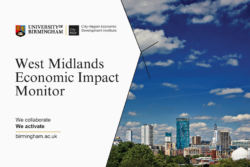Professor Rebecca Riley looks at the UK Treasury’s Green Book guidance, arguing that while it’s a valuable decision-making tool, it’s often misused or misunderstood, leading to poor public investment outcomes and calling for better training and cultural change. It’s been an interesting few weeks in Green Book land following the report on the Treasury’s review. … Continue reading “From Tick Box to Toolbox: Rethinking the Green Book”
Policy News – June 2024
This blog summarises the latest policy news that is important to place, including reports, inquiries, consultations, government research and events. Reports from Academics and Think Tanks Title Details Published Build to Rent: Patterns in growth and geography This briefing from the Centre for Cities examines the growing role of Build to Rent (BtR) … Continue reading “Policy News – June 2024”
Exploring Emerging and Future Opportunities in the West Midlands Combined Authority Region
The West Midlands Combined Authority (WMCA) has published “West Midlands Futures – Exploring Emerging and Future Opportunities in the West Midlands Combined Authority Region”, a study completed by the Economic Intelligence Unit (EIU) and City-REDI team. Making Place-based Futures in the West Midlands In August 2022, the WMCA published the West Midlands Plan for Growth. … Continue reading “Exploring Emerging and Future Opportunities in the West Midlands Combined Authority Region”
Project Spotlight: The BBC in the West Midlands: A Vital Cultural and Economic Force
In a new series of blogs, we will be reviewing the current and historical work of City-REDI. In the latest blog, we examine the work of Dr Matthew Lyons and Dr Huanjia Ma with BOP Consulting, assessing the likely future economic contribution of the BBC to the West Midlands due to renewed investment in the … Continue reading “Project Spotlight: The BBC in the West Midlands: A Vital Cultural and Economic Force”
Undercounting Women’s Work: The Hidden Reality of Multiple Jobholding
The ADR UK multiple employment project, headed by City-REDI’s Dr Darja Reuschke, reveals that official employment figures underestimate women’s contribution to the UK labour market. By failing to account for multiple jobholding — especially common among women — the data risks misleading policymakers, employers, and economists. A Misperceived Picture of Part-Time Work Official statistics suggest … Continue reading “Undercounting Women’s Work: The Hidden Reality of Multiple Jobholding”
What does the 2025 Spending Review mean for Place-Based Economic Development?
One year on from winning the General Election, the Labour Government have outlined its spending review for 2025. Over the course of the Government’s first year, headlines about public finances have focused on tightening budgets. On the one hand, this Spending Review follows in a similar vein. But there are also relatively significant increases in … Continue reading “What does the 2025 Spending Review mean for Place-Based Economic Development?”
Strengthening the UK’s R&D workforce: Insights from a DSIT–City-REDI research collaboration
This blog shares details from a recent research paper published by the Department for Science, Innovation and Technology (DSIT). The study explores long-term trends, challenges, and future skills needs in the R&D workforce. Introduction A strong research and development (R&D) workforce is vital for the UK. Skilled R&D professionals play a crucial role in driving … Continue reading “Strengthening the UK’s R&D workforce: Insights from a DSIT–City-REDI research collaboration”
West Midlands Economic Impact Monitor – 3 June 2025
Fragile growth, rising trade tensions and increased cost pressures are shaping the national and regional economic outlook. In this context, business leaders have warned that firms are seeking a ‘platform of stability’. Trade deals between the UK and the US and between the UK and India are viewed as positive. Curbs on immigration set out … Continue reading “West Midlands Economic Impact Monitor – 3 June 2025”
City-REDI Roundup – May 2025
This blog summarises the reports City-REDI have put out in May 2025. Catch up on all the latest reports and projects in one place. Revealed: How much the US-UK trade deal will save the UK economy from Trump tariffs Research Fellows Dr Matthew Lyons and Huanjia Ma have been quoted in The Independent for their … Continue reading “City-REDI Roundup – May 2025”
Meet Tom Burton, our New Senior Economic Analyst
I joined City-REDI at the end of 2024 from the West Midlands Combined Authority, where I was in the housing and regeneration policy team. I am an economic analyst and policy advisor with a background in built environment investment projects. My background I’ve worked in regional development since 2016, contributing to a mix of strategy … Continue reading “Meet Tom Burton, our New Senior Economic Analyst”










